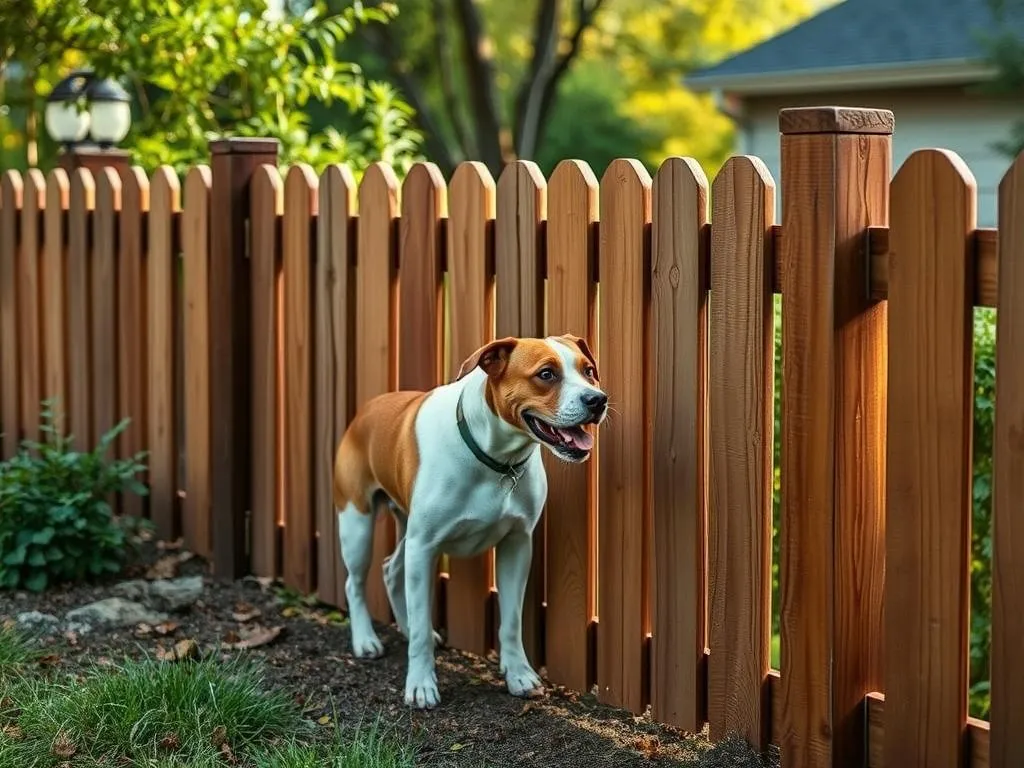
Ensuring the safety of our furry friends is a top priority for pet owners, and one of the most effective ways to do this is by installing a dog fence. Not only does a dog fence provide a safe space for your pet to play and roam, but it also gives peace of mind to owners. However, before diving into the installation, it’s essential to understand the various types of dog fences available and the factors that influence the overall costs.
Types of Dog Fences
Traditional Fencing
Traditional fences are the most common option for pet owners. They come in various materials, including wood, vinyl, and chain-link.
-
Wooden Fences: These are aesthetically pleasing and can blend well with your outdoor environment. However, they require regular maintenance, such as painting or staining, to prevent rotting.
-
Vinyl Fences: These are durable and low-maintenance, making them a popular choice among homeowners. They are available in various styles and colors.
-
Chain-Link Fences: These are often the most affordable option and provide a clear boundary for pets. However, they may not block the view or noise from the outside.
Pros and Cons of Traditional Fencing:
| Pros | Cons |
|---|---|
| Aesthetic appeal | Higher upfront costs |
| Durable | Requires maintenance |
| Clear boundary | Limited privacy |
Typical Installation Costs: The installation cost for traditional fencing ranges from $15 to $50 per linear foot, depending on the material chosen and local labor rates.
Invisible or Underground Fences
Invisible or underground fences offer a unique solution by using a buried wire that creates a boundary for your dog. When your pet approaches the boundary, they receive a warning signal, followed by a mild correction if they cross the line.
Pros and Cons of Invisible Fencing:
| Pros | Cons |
|---|---|
| Unobtrusive and aesthetic | Requires training for pets |
| Can cover irregular shapes | May not contain all dogs |
Average Costs for Materials and Installation: The cost for an invisible fence system typically ranges from $1,000 to $2,500, depending on the size of the area and whether you choose a DIY or professional installation.
Wireless Dog Fences
Wireless dog fences function similarly to invisible fences but do not require any digging. They use a transmitter placed in the home to create a circular boundary.
Benefits and Limitations of Wireless Options:
| Benefits | Limitations |
|---|---|
| Easy to set up | Limited range |
| Portable | May not work for large areas |
Cost Breakdown for Wireless Systems: Prices for wireless dog fences generally range from $200 to $400, depending on the brand and features included.
Portable Dog Fences
Portable dog fences are ideal for temporary use or for pet owners who travel frequently. They can be easily set up and taken down, making them versatile for various situations.
Situations Where Portable Fences are Ideal:
- Camping trips
- Outdoor events
- Temporary containment during gatherings
Cost Assessment for Portable Options: The cost for portable dog fences can vary widely, typically ranging from $50 to $300, depending on the size and material.
Factors Influencing Cost of Dog Fence Installation
Size of the Area
One of the most significant factors influencing the cost of dog fence installation is the size of the area being fenced. Larger areas will require more materials and labor, increasing the overall cost.
Examples of Average Costs Based on Yard Size:
- Small Yard (up to 1,000 sq ft): $1,000 – $2,000
- Medium Yard (1,000 – 2,500 sq ft): $2,000 – $4,000
- Large Yard (over 2,500 sq ft): $4,000 – $10,000+
Material Choice
The choice of material can significantly impact the overall cost. For instance, wooden and vinyl fences tend to be more expensive than chain-link options.
Cost Differences Between Materials:
- Wood: $15 – $50 per linear foot
- Vinyl: $20 – $40 per linear foot
- Chain-Link: $10 – $30 per linear foot
Additionally, consider the long-term maintenance costs associated with each material. Wooden fences, while beautiful, may require more upkeep than vinyl or chain-link options.
Labor Costs
Labor costs can vary depending on the complexity of the installation and local market rates. Typically, professional installation can add between $5 to $15 per linear foot to the total cost.
Factors That May Increase Labor Costs:
- Uneven terrain
- Accessibility issues
- Additional features such as gates or landscaping
Local Regulations and Permits
Before installation, it’s crucial to check local zoning laws and regulations regarding fencing. Some areas may require permits, which can add to the overall cost.
Potential Costs Associated with Permits and Inspections: Permit costs can range from $50 to $500, depending on the jurisdiction.
Additional Features
If you wish to enhance your dog fence with gates, locks, or decorative elements, this will also influence the cost.
Cost Implications of Adding Features:
- Gates: $150 – $500 each
- Locks: $50 – $150 each
- Landscaping: Varies widely based on design
Cost Breakdown: Average Prices for Different Fence Types
Traditional Fencing
The average cost per linear foot for various materials is as follows:
| Material | Cost Per Linear Foot |
|---|---|
| Wood | $15 – $50 |
| Vinyl | $20 – $40 |
| Chain-Link | $10 – $30 |
Example Project Costs for Average-Sized Yards: For a typical yard of 150 linear feet, costs might look like this:
- Wooden Fence: $2,250 – $7,500
- Vinyl Fence: $3,000 – $6,000
- Chain-Link Fence: $1,500 – $4,500
Invisible or Underground Fences
For invisible fences, costs can vary significantly based on the installation method:
- DIY Installation: $1,000 – $1,500
- Professional Installation: $1,500 – $2,500
Comparison of Different Brands: Popular brands like PetSafe and SportDOG offer systems ranging from $1,000 to over $2,000, depending on features and coverage area.
Wireless Dog Fences
Wireless dog fences usually range in price as follows:
- Basic Models: $200 – $300
- Advanced Models: $300 – $400
Example Scenarios of Costs for Multiple Pets: If you have multiple pets, expect to pay an additional $100 to $200 per extra collar.
Portable Dog Fences
Cost estimates for various types of portable solutions:
| Type | Cost Estimate |
|---|---|
| Simple Mesh Fence | $50 – $100 |
| Panel Fencing | $100 – $300 |
| Heavy-Duty Solutions | $200 – $400 |
Recommendations for Popular Brands: Brands like PetSafe and IRIS are known for their quality portable fencing solutions.
DIY vs. Professional Installation
Benefits of DIY Installation
Opting for a DIY installation can lead to significant cost savings, allowing you to invest more in quality materials.
Necessary Tools and Skills for Installation: Basic tools like a post-hole digger, level, and tape measure are typically required. Some DIY skills in construction or landscaping can also be beneficial.
When to Hire a Professional
While DIY can save money, there are situations where hiring a professional is advised, especially for large or complex installations.
Average Costs of Hiring a Contractor: Hiring a professional can add about $5 to $15 per linear foot to your total costs.
Cost Comparison
A side-by-side comparison shows that a DIY installation might cost you $1,500 for materials alone, while professional installation could range from $2,500 to $5,000, depending on the project size and complexity.
Tips to Save on Dog Fence Installation
Planning and Budgeting
Creating a budget before starting your project is crucial. It helps in understanding what materials you can afford while ensuring you do not overspend.
Shopping for Materials
Consider local suppliers or online marketplaces for discounts on materials. Sometimes, buying in bulk can lead to significant savings.
Timing of Installation
The time of year can affect pricing. Many contractors offer discounts during the off-peak seasons, such as fall and winter.
Conclusion
In summary, the cost to install a dog fence can vary widely based on the type of fence, materials, labor, and additional features. By understanding the various options available and the factors that influence costs, you can make an informed decision that best suits your needs and budget. Investing in a dog fence is not only about creating a safe environment for your pet but also about enhancing your peace of mind as a responsible pet owner.









